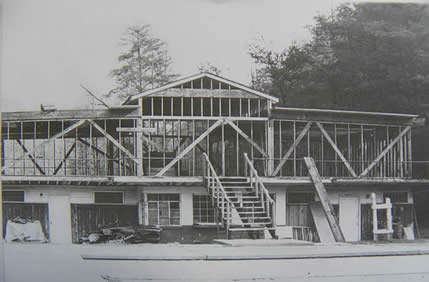
Knott County ranks fifth nationwide for opioid hospitalizations. Culture of Recovery, based at the Appalachian Artisan Center (AAC) in Hindman, is looking to change that. By partnering with local substance abuse recovery programs Hickory Hills Recovery Center and the Knott County Drug Court, they are bringing an art-integrated approach to the fight against addiction.
The program started in 2018 and offers art and entrepreneurial workshops in painting, journal-making and cooking, as well as apprenticeships in craft trades like blacksmithing, luthiery (or, instrument making) and ceramics to those in recovery. The program promotes creative expression, skill-building, and economic opportunity for those struggling to overcome addiction through a mentorship and apprenticeship approach.
The Culture of Recovery (COR) program manager said they have about 36 participants per week from either Hickory Hills or the Drug Court.
Individuals who enter Drug Court after being convicted of a criminal offense struggle with serious substance abuse disorders. Drug Court offers long-term drug treatment and court supervision instead of a jail sentence. Depending on the offense, individuals can be in the program for a few months or a few years. COR has become a major component of programming for many in Drug Court.
I’m hopeful to get my life straightened back up to where it was 25 years ago. Be able to have something before I retire. Right now, I’ve lost everything and rebuilt it all four times in my life. I’m just tired of rebuilding everything.
– COR participant
Hickory Hills is a private rehabilitation facility located on a reclaimed mine site in Knott County. Most participants are in the program for 9-12 months, and can continue as a peer mentor after they complete the program. Patients have regimented schedules from morning to evening. COR offers a two-hour program for Hickory Hills residents on Wednesday afternoons.
Current COR programming includes:
- ArtSlams: Single-day workshops designed for beginners and experienced artists. Participants take part in song writing, journal making, acrylic painting, poetry, printmaking and more. COR employs many local artists to lead these workshops. For example, well known artist Jeff Chapman Crane led a mini-art journey in watercolor. Local jewelry maker Jill Robertson has taught jewelry making.
- ArtJourney: Long-term mentorship programming in blacksmithing, pottery and luthiery. Participants work with master artists Dan Estep (blacksmithing), Jessica Evans (pottery) and Doug Naselroad (luthiery) over the course of their recovery. If they wish to continue post-recovery, they can learn the tradecraft, and thus, employable or entrepreneurial skills.
- Community Engagement Projects: A variety of projects with the community at large. Examples include exhibits, murals and sidewalk art.
“A lot of participants make things for people they love – people they have harmed throughout their addiction – and find the programs simply therapeutic. However, we have already had a few who love working in the arts enough to turn it into a business,” the program manager said.

One example is Saving Grace Pottery, recently started by COR participant Kim Patton. AAC worked with Patton to sell her a pottery wheel, assist her with setting up an Etsy shop, and in creating a logo. She is currently selling her items at AAC’s store, on Etsy and at local craft fairs. She also now teaches pottery for COR.
Another example is Nathan Smith, a former coal miner hired out of COR as an apprentice luthier at Troublesome Creek Stringed Instruments Company, a new manufacturing facility based in Hindman.
Patton traveled with COR this summer to Frankfort to a meeting of the specialty courts. Patton demonstrated pottery and Hall shared COR’s experiences with drug courts in other Kentucky counties. Outside of Knott County, COR said very few drug courts incorporate art into their programs. Hands Healing in Frankfort, which incorporates arts for women in recovery, is one of the only other examples in the state.
AAC is working to record oral histories of those going through COR, and are sharing those on social media nearly every day. Anyone is invited to share in these journeys to recovery.

“Most drug courts use community service as a form of treatment, which sometimes feels like a punishment to those in recovery. We are changing the punishment model into a creative model,” the COR program manager said. “Art is something that serves and strengthens those in recovery.”
COR is funded by Art Place America and is currently in its first year of a 2.5-year grant. They have also received support from the Kentucky Arts Council. COR also partners with East Kentucky Concentrated Employment Program (EKCEP) to teach business classes.
Finding innovative ways to assist individuals combating addiction, and to help the community understand addiction, involves more people in the movement for Appalachia’s New Day.
About: This is story #34 in the Appalachia’s New Day campaign, a new storytelling effort launched in June 2019 by MACED for Eastern Kentucky communities. We can work with you to help identify, shape and amplify stories about businesses, programs and initiatives in your community that are helping build a new economy. Read more stories here. Contact us or sign up here if you would like more details.





